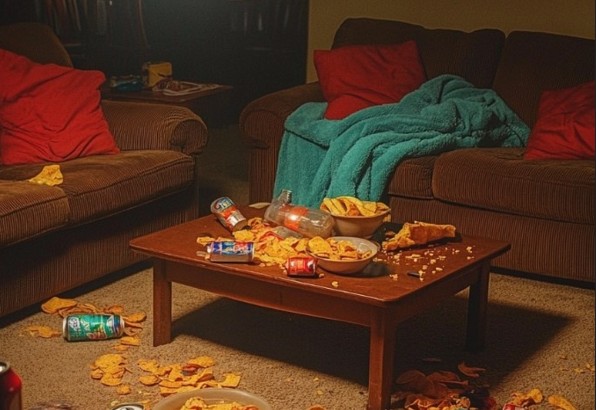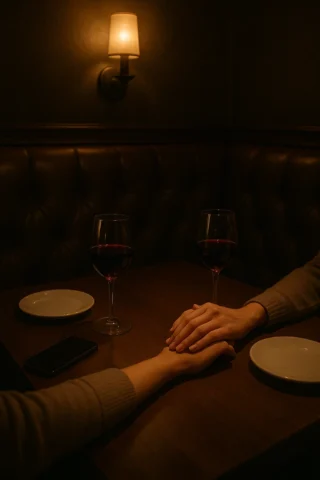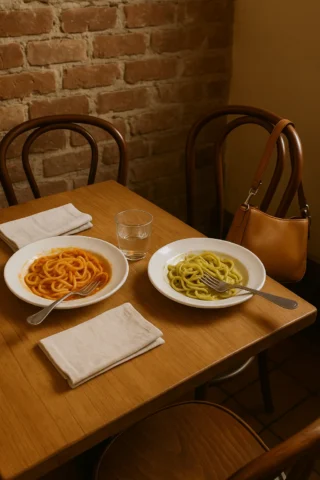
You know that awful feeling you get when someone steps on your good nature like it is an old doormat? My name is Diana, and for three very long months I felt like a paid cleaner in my own house. My grown‑up step‑daughter treated every room as her private landfill and acted as if I had been born only to serve her. She soon learned that patience and kindness do have borders, and that even the nicest person can draw a hard line when pushed too far.
Tom, my husband, and I had spent ten happy years building our small world together. Our cottage on Redwood Lane was not big or fancy, but it felt like a hug. Sunlight spilled across the wooden floors in the morning. Laughter bounced off the hallway walls in the evening. On Sundays we made pancakes, shared a big mug of coffee, and battled over crossword clues until one of us guessed the last word. It was a quiet, simple life, and we loved it.
My son, Rick, was away at college, busy with projects and late‑night study sessions. He sent photos of campus trees in the fall and short notes like, “Love you, Mom! Midterms are rough.” Tom’s daughter, Kayla, twenty‑two and stylish, had always walked on the edge of our life. She answered birthday texts with a thumbs‑up emoji and skipped family dinners with “Sorry, something came up.” She was not openly rude, but her cool silence hurt in a different way. It felt like being frozen out of your own story.
I tried to reach her. I sent birthday cards filled with heartfelt words. I invited her to movie nights, to thrift‑store hunts, to backyard barbecues. My questions about her dreams lined up politely in my throat, only to bump into her one‑word replies. Indifference can sting sharper than anger, because there is no fire to fight—just cold gray fog.
Then one wet Tuesday evening the phone rang. I heard Kayla’s shaky voice crackling through the speaker. She had broken up with her boyfriend, her lease had fallen apart, and she asked if she could come home “just for a short time.” Before I could even nod, Tom said, “Of course, sweetheart. You’ll always have a place here.” He did not glance at me for agreement, and I bit my tongue. What else could I do but smile and squeeze his hand?
Three days later the doorbell chimed and a storm blew in wearing designer boots. Kayla dragged three huge suitcases, two tote bags stuffed beyond reason, and a duffel big enough to house a small family of raccoons. She brushed past me with a soft “Hey,” headed to the guest room I had painted light blue, and dropped her bags so hard the framed photos trembled on the wall.
“This’ll do,” she said, already scrolling her phone.
“Welcome home, honey,” I managed. “I cooked your favorite tuna casserole.”
She glanced at the dish. “Oh, I already grabbed sushi on the way. But thanks.” Her untouched slice sat in the refrigerator until mold turned the cheese green and I tossed it, my hands shaking with disappointment.
Trouble started small. A cereal bowl on the coffee table, the milk inside turning into a ghostly film. Makeup wipes dotting the bathroom sink like wilted petals. Empty water bottles hidden under sofa cushions. Each abandoned item felt like a tiny jab: You clean it, not me.
I tried kindness first. “Sweetie, could you drop these bottles in the recycling bin when you’re done?” I asked, holding one up with a hopeful smile.
She lifted her eyes from her screen, shrugged, and said, “Sure. Whatever.” The bottles kept multiplying, rolling over the floor like plastic tumbleweeds on a deserted road.
Tom gave me a gentle shrug. “She’s settling in, Di. Give her time.” So I gave her time, gave her space, and bit my tongue until it nearly bled.
Weeks slid by. Amazon boxes stacked near the entry like cardboard mountains. Dirty dishes traveled to every surface in the house, forming little villages of grime. I found socks in the hallway, sticky mugs on the piano, even a slice of pizza resting on the radiator like it was sunbathing.
One night I reached under the couch cushion and pulled out a banana peel—brown, sticky, and very real. You know the cartoon gag where someone slips on a peel? That peel was now living in my living room.
“Kayla,” I called, my voice even. “Can you come here for a second, honey?”
She entered, flawless in pricey jeans that could pay a month of my mortgage. “What’s up?”
I held up the peel. “I found this under the couch.”
She stared at it, then at me. “Okay?” she said, the word flat as a pancake.
“This isn’t normal,” I replied quietly. “Please help me keep our home clean.”
She sighed so loudly it sliced the air. “Fine, Diana. I’ll try.” But try she did not.
The tipping point arrived on a Sunday that began like a postcard. Tom left for golf, promising to bring Chinese takeout for dinner. I spent the morning scrubbing the living room until every surface shone. The scent of lemon cleaner mingled with the basil growing on the windowsill, and for a moment I breathed easier.
I stepped into the backyard to pick cherry tomatoes, humming a tune Rick used to play on his guitar. When I came back inside, my mouth dropped open. Fast‑food bags sprawled across the coffee table like casualties of war. Soda cans leaked circles onto the wooden floor. Bright orange cheese puff dust was ground into the cream rug I had saved for months to buy.
And there, on the sofa, lay Kayla with her shoes on my freshly cleaned table, scrolling her phone. She looked up, smiled casually, and said, “Hey, Diana! I’m starving. Can you whip up your pancakes—the ones from my birthday? They’re actually pretty decent.”
I stood silent, staring at the ruins of my morning’s work. “I think we’re out of mix,” I said at last. “Maybe order something.”
That night, lying beside Tom’s gentle snore, I made a decision. If Kayla saw me as her maid, the maid was clocking out.
Monday morning, Operation Clean Nothing began. Every dish she left stayed put. Every wrapper, empty can, and half‑eaten sandwich remained exactly where she abandoned it. By Tuesday the coffee table looked like a landfill.
“Diana!” Kayla shouted. “Did you forget to clean up in here?”
I poked my head in. “Those aren’t my dishes.”
“But you always clean them!”
“Do I? I don’t recall signing an agreement.” I tilted my head like a confused puppy. She gaped at me.
That night Tom arrived home to find Kayla clanging dishes into the dishwasher for the first time. He whispered, “What’s happening?” I smiled. “Just promoting independence.”
Thursday I advanced to phase two: Personal Return Service. Anything with Kayla’s fingerprints—chip bags, tissues, a bruised pear—earned a first‑class trip to her bedroom. I wrote her name on each item with a Sharpie and placed everything neatly on her pillow, plus a note: “Thought you might need this! Love, Diana.”
She discovered the collection at bedtime and thundered downstairs holding a moldy apple core. “What is this insanity?”
“That’s yours,” I said calmly. “I worried it was valuable.”
“It’s garbage!”
“Interesting. Then why was it under the couch?”
Words failed her. She opened and closed her mouth like a fish looking for water.
The grand finale came the next Tuesday. Kayla’s lunchbox waited on the counter each morning. She always grabbed it on autopilot, never peeking inside. That day I packed it carefully, arranging her weekly trash like a twisted bento box: the famous banana peel (now sealed in a sandwich bag for smell control), a lipstick‑stained tissue, empty snack bags folded like napkins. I closed the lid and wished her a lovely day.
At twelve‑thirty my phone buzzed: “WHAT IS WRONG WITH YOU, DIANA???”
I typed gently: “Thought you might enjoy leftovers. Hugs!” And I added a red heart for good measure.
The reply? Silence—long, heavy, golden silence.
She came home quietly that evening. No door slam, no storming. She paused in the entry, eyes scanning the cluttered house as if seeing it for the first time.
Tom was working late, so it was just us. “Diana?” she called, voice softer than I’d ever heard.
I looked up from my crossword puzzle, the Sunday ritual I missed. “Yes?”
“The living room looks nice.”
I glanced around. The only tidy corner was the one I had cleaned for myself. “Thank you.”
She nodded and went upstairs. Soft sounds followed: drawers opening, plastic rustling, a vacuum turning on. I felt something loosen inside my chest.
The next morning, I woke to a spotless living room. The dishes were in the washer, the trash was gone, and Kayla’s laundry sat folded in a neat pile by the stairs. She appeared in the kitchen door, chewing her lip.
“I cleaned up,” she said.
“I noticed. Thank you.”
She picked an apple from the fruit bowl and started to leave, then paused. “Diana?”
“Yes?”
“If I’d like pancakes again someday… I’ll ask nicely.”
A small smile tugged my mouth. “That’s all I ever wanted.” She nodded and headed out the door, shoulders lighter than before.
Two months have passed since the Legendary Lunchbox Lesson. Kayla still loves fancy shoes and online shopping, but she also wipes counters, takes her plates to the sink, and says please and thank you. We will probably never braid each other’s hair or share deep secrets, yet respect and calm have bloomed where tension once lived.
Last weekend we planted marigolds in the front garden. She grumbled about dirt under her nails but kept working. On Sunday we made pancakes together—side by side, flipping golden circles onto plates. She ate four, laughed at her syrup moustache, and said, “They’re better than I remembered.”
Tom asked how I managed to change his daughter from a whirlwind into a reasonable adult. I only shrugged. “Sometimes people must stare at their own mess before they can pick up a broom.”
Kindness opens the first door, but clear boundaries close the door behind you to keep the peace. And sometimes the quiet people you overlook turn out to be the strongest voices in the room once they decide to speak.


